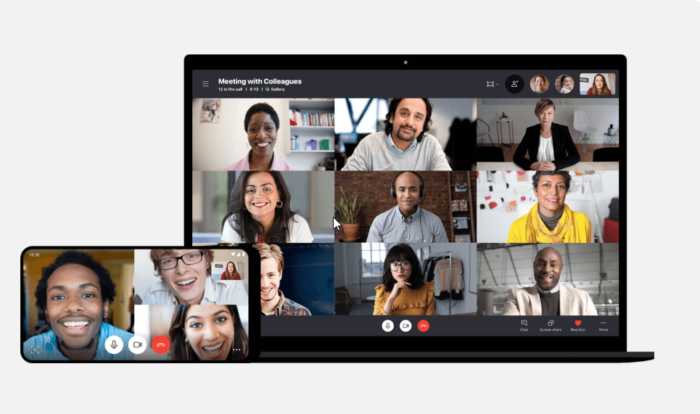Any lapses in the security of video conferencing apps that require access to microphones and cameras have a significant impact on the way people communicate via online apps. As such, it is essential to have proper safety measures in place should there be an event of misfortune. Microsoft Skype addresses most of these concerns. It’s easy to set up and use Skype but you should also take a few precautions to stay safe online while using Skype. Here are a few important Skype Safety tips for beginners.

Important Skype Safety tips for beginners
If you have found a security vulnerability in any of Microsoft’s Skype apps or online services, you can report it instantly. Also, by following the list of instructions, you can help keep your account secure.
- Protecting your computer
- Be careful from online fraud
- Phishing
- Keeping Skype up-to-date
- Configure Privacy settings
Most important of all, always use a password that is unique and strong. Use a mixture of letters, numbers, and characters.
1] Protecting your computer
Cybersecurity experts and always maintained it’s not a good practice to open any suspicious-looking attachments from people you know or email attachments from people you don’t know. So, whenever in doubt, contact the person who sent you the email to confirm it’s legitimate.
Always use an antivirus program to check the files you receive from other people and keep your antivirus software up-to-date. Microsoft’s Windows Defender may not qualify as the best antivirus software, but it’s surely good enough to be your main malware defense.
Also, be careful in choosing which sites you visit and make sure to always download content from the official website.
2] Be careful from online fraud
With rapid Internet expansion, online fraud has become rampant. As such, it is necessary to become fully aware of the fraud risks specific to use video conferencing apps like Skype.
Always make sure you trust a website or merchant before giving your credit card information to any site that claims to be reselling Skype products. Buy Skype Credit and subscriptions directly from the Skype website.
Sadly, most of us face online fraud at some point, and it’s often after the unpleasant experience we become fully aware of the fraud risks specific to online frauds.
Secondly, never reply to fraud Skype emails requesting you to provide your credit card details, password, or other data. Skype NEVER request such data by email. Its Customer Service agents may request your payment/order details or ticket tracking numbers, but they will never ask details related to your credit card data or password.
TIP: Use a VPN software for Skype to stay private.
3] Phishing
In recent times, Phishing too has become a major menace. It refers to an attempt by a malicious third party to acquire sensitive information like a username, password, or credit card details, by pretending to be a genuine company or website.
There are many types of phishing. Some of the popular ones are:
- General regular emails asking you your personal details are the most used form of phishing
- Spear phishing
- Whaling scams
- Smishing (SMS phishing) and Vishing
- QRishing scams
- Tabnabbing
You can read about them in detail in our Types of Phishing post.
Having informed our readers about Phishing and its types, it’s necessary to help them avoid falling prey to it and stay safe online while using Skype.
The best defense against phishing is vigilance. While tools like spam filters and others are increasingly effective, it has been found that some phishing emails still get through. So, by increasing your awareness of phishing techniques, and your alertness in acting upon them, you can keep such attacks at bay.
Firstly, beware of emails with a false sense of urgency, such as,
- ‘Your account has been compromised, click here to view details’.
- ‘Confirm your account details’.
Also, if you ever receive an email asking you to follow or click the links in the email, do not oblige to such requests. Instead, type skype.com into your browser and go to your account directly from the Skype website.
If you receive an email claiming to be from Skype that has an attachment, do not open the attachment blindly.
Similarly, if you receive an email claiming to be from Skype and you suspect it to be dubious, do not reply to the email or open any attachments to the email. Genuine emails from Skype are usually sent from email addresses ending with:
- @emails.skype.com
- @email.skype.com
- @skype.delivery.net
- @notifications.skype.com
- @alerts.skype.com
- @skype.net
- @css.one.microsoft.com
If you receive an email that’s not from one of the addresses given above, be sure it’s fraudulent. Even if it is from one of those addresses, we would advise you to exercise caution.
Other measures that can help you stay safe while using Skype online include,
4] Keeping Skype up-to-date
Skype makes improvements to its service on a daily basis to enhance its quality and make the service more reliable and secure. So, make sure you have updated to the latest version of Skype.
Read: Blank Blue Log in Screen during login in Skype
5] Configure Privacy settings
Skype’s privacy settings let you control and manage who can contact you on Skype.
These links may also interest you:
Outlook.com Sign In | Yahoo Login | Facebook Sign In | Twitter Sign In Help | PayPal Login | Gmail Sign In | LinkedIn login tips.